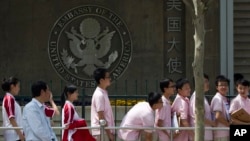Student Union
- By Nick Dugan
Some Students Not Well-Schooled About Plagiarism
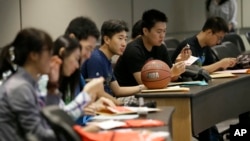
International students in the United States are more susceptible to plagiarism — using someone else’s academic work as one’s own — and are more likely to be caught than their American counterparts, studies show.
Plagiarism has long permeated American universities among all students. But increases in international student enrollment have raised new concerns on where plagiarism happens and how to combat this form of cheating.
At the University of Minnesota, approximately 85 percent of investigated plagiarism cases originate from students whose native tongues are not English.
Similar research from other universities shows international students are reported for plagiarism at twice the rate of their domestic peers and are more likely to misunderstand the methods of avoiding academic integrity violations.
This discrepancy can be linked to language and cultural barriers.
“In the case of plagiarism, one factor is that it concerns written material. International students are often not native English speakers,” said David Mills, a University of Virginia economics professor. “Their skills and comfort in using the English language may be more limited.”
Students from India and China, who make up half of the international student population in the United States, often come to America without an understanding of plagiarism and how to avoid using another's work.
In the past five years, the percentage of Chinese international students expelled specifically because of academic dishonesty and plagiarism has increased every year, reaching 33.5 percent in 2017, according to the WholeRen Education Research Center.
One factor to consider regarding plagiarism statistics is American students who copy another person’s work may be more adept at avoiding getting caught, compared to their international peers.
Watch: Why students cheat
Culturally, international students may come from a background in which using words or ideas from other sources is not considered punishable, since some cultures may consider individual works as shared or communal. As a result, students don't put as much emphasis on attribution.
International schools also place more of an emphasis on memorization learning rather than original writing and concept creation. This creates a further divide between a student’s expectations and a university’s standards.
Many students struggle at first to adjust to a more vigilant system that is tougher on certain uses of another person’s work.
“I’ve seen people get caught for it, and I’ve thought about, ‘What if they did the same thing back home’ and it’s two completely different consequences because of the notion of what the word means and how much is tolerated,” said Smaran Shantharaju, a University of Virginia student from India.
WATCH: Plagiarism and international students
Educators and researchers alike have also pointed to the stress of university classes as a contributor to rates of plagiarism.
Among international students, the stresses of a new environment, new language, and new education system make educational resources on plagiarism and academic guidelines vital in any university hoping to aid international students.
“You’re facing many different cultural and social differences in terms of how people treat you, which could add on unreasonable pressure. You could be thinking that if everything else isn't working, I want to be good at something, so you spend your time stressing on education and you no longer see what’s right or wrong,” Shantharaju said.
Universities taking action
Universities are stepping up their efforts to address this lack of understanding on U.S. standards of academic integrity. Writing centers, mandatory workshops and other resources have become a focus for universities trying to educate incoming international students.
Schools such as Western Kentucky University and Columbia University graduate school have adopted plagiarism tutorials, requiring incoming students to complete an academic integrity workshop.
In recent years, universities like California State University, Los Angeles have made plagiarism statements mandatory on all course syllabi, so students can gain a clearer understanding of what each professor expects.
These small measures have been created specifically to provide simple explanations and resources to all students.
Jayati Chaudhuri, a Cal State university librarian and researcher who runs plagiarism workshops, says schools must adopt a more comprehensive effort to educate foreign students.
Educators like Chaudhuri have found the biggest motivator for students to learn about plagiarism comes only after they have received a poor grade or been caught for plagiarism and sent to their university’s writing center.
Although progress has been made as universities identify a disconnect between their expectations and international students, a divide remains in how these students are being informed. Chaudhuri says different departments and educators must work jointly to give students ample opportunities to learn.
“There has to be a collaboration of faculty, librarians, and international student education,” said Chaudhuri. “And there has to be more writing intensive courses or training for students.”
“We need to offer it in the beginning of their academic careers, so when they are actually going through a semester, they are well-equipped to fight this problem.”
See all News Updates of the Day
- By VOA News
International students discuss US campus culture shock

International students at De Anza College in Cupertino, California, talked about culture shock in an article in La Voz News, the student newspaper.
"It felt like a major culture shock. Everything was so different, from academics to mannerism," said a student from Mexico.
Read the full story here.
These are the most expensive schools in the US
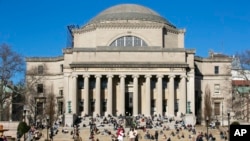
High tuition costs along with housing and food expenses can add up for students at U.S. colleges and universities.
MSNBC looked at the most expensive schools in the country, with one costing more than $500,000 for a bachelor’s degree. (June 2024)
Uzbekistan students admitted into top US universities
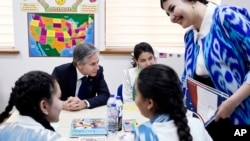
Students from Uzbekistan are among the international students admitted to top colleges and universities in recent years.
Gazata.uz profiled some of the Uzbekistan students attending Harvard, Brown, Princeton and other U.S. universities. (June 2024)
- By Stella Hsu
Reports of visa checks, deportations worry Chinese STEM students in US
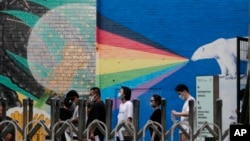
Geopolitical tensions and growing competition in tech between the United States and China appear to be spilling over into academia despite commitments from the world’s two biggest economies to boost people-to-people exchanges.
The United States remains the top choice for Chinese students seeking to study abroad with nearly 300,000 studying in American colleges and universities during the 2022-2023 school year. But reports of some cases that students and professors are facing extra scrutiny while passing through immigration and the deportation of others are raising concerns.
For Chen Xiaojin, a doctoral student studying semiconductor materials at a university in the Washington, D.C., metropolitan area, it has been six years since she returned to her hometown of Beijing.
At first, it was the COVID-19 pandemic that kept her from going home. But over the past two years, she has been deterred by accounts of Chinese students majoring in science and engineering being required to reapply for their visas upon returning to China.
She also says she is worried by reports over the past six months of Chinese students being deported, even at nearby Dulles Airport.
"My current research is relatively sensitive, and my boss [adviser] is getting funds from the U.S. Department of Defense, making it even more sensitive,” she told VOA. "I am afraid that I won't be able to return after I go back [to China]."
Chen says that if she did return to China, she would have to apply for a new visa.
In a report late last month, Bloomberg said it had found at least 20 Chinese students and scholars with valid visas who were deported at U.S. Customs since November and barred from reentry. The U.S. Customs and Border Protection Agency does not release relevant data.
Immigration attorney Dan Berger represented one Chinese student who was deported late last year. He tells VOA Mandarin that the student studied biological sciences at Yale University and was about to complete her doctorate.
She visited her family in China and got a new visa but was deported by customs at Dulles Airport and barred from reentering the country for five years. Berger said he did not see anything suspicious in the transcript of the conversation between the student and the customs officer.
"We have seen what seems like a pattern over the last six months of Chinese PhD students being turned around…. more than I've seen in quite a while," he said.
Matthew Brazil, a fellow at the Jamestown Foundation, said neither country seems willing to explain the situation. However, he believes that in most cases, the United States must have valid reasons for blocking visa holders from entering the country.
In some cases, the student’s background may not match what is written on the visa application. In other cases, customs agents may also find something that the State Department missed, and once they see it, they are responsible for taking action.
"I wish the Chinese side would be specific about their students who were refused entry,” he said. “The fact that both sides are mum on details and that the Chinese side is engaged with the usual angry rhetoric means that each has security concerns. And that says to me that there was good reason for the U.S. to stop these particular applicants."
Brazil also sees a connection between the entry denials and export control regulations issued by the United States in October 2022 that restrict China's ability to obtain advanced computing chips, develop and maintain supercomputers, and manufacture advanced semiconductors.
U.S. Customs and Border Protection is one of the law enforcement agencies authorized to investigate violations of export control regulations, he said.
"Beijing's intelligence agencies are known to focus attention on PRC [People's Republic of China] students and scientists headed abroad who study or work on dual-use technologies controlled under the Export Administration Act — compelling Chinese students and scientists to report on what they've learned when they return to China on holiday,” he said. “This has been true for decades."
Bill Drexel, a fellow for the Technology and National Security Program at the Center for a New American Security, said the U.S. government did find some cases where students tried to steal strategic technology for China.
"I think it would both not be surprising that they found some really questionable or incriminating evidence for some students,” he said. “It would also not be surprising if, in their hunt for really solid evidence, they also may have made some mistakes on other students.”
Drexel adds that “it’s just kind of an unfortunate fact of the time that we live in and the tactics that the CCP uses when it comes to these measures."
In a post on X in early May, U.S. ambassador to China Nicholas Burns tried to dispel concerns about visas and entry to the United States for students and scholars. In the post, he said "99.9% of Chinese students holding visas encounter no issues upon entering the United States.”
In an interview with The Wall Street Journal Monday, Burns said it is China that is making it impossible to promote people-to-people ties. Burns told the Journal that students attending events sponsored by the United States in China have been interrogated and intimidated.
He also said that since U.S. President Joe Biden and China’s leader Xi Jinping held their summit in San Francisco last year, China’s Ministry of State Security and other agencies had interfered with Chinese citizens’ participation at some 61 events.
At a regular briefing on Wednesday, Chinese Foreign Ministry spokesperson Mao Ning dismissed those accusations, saying that they did not “reflect reality" and that went against key understandings reached by both countries’ presidents in San Francisco.
“The United States, under the pretext of 'national security,' unjustifiably harasses, interrogates, and deports Chinese students in the U.S., causing them significant harm and creating a severe chilling effect,” Mao said. “The image of the United States in the minds of the Chinese people fundamentally depends on the actions of the United States itself.”
Drexel said he believes Burns’ comments about visas and students' willingness to study in the U.S. still ring true.
“On balance, it's still the case that American universities are overwhelmingly warm towards Chinese students and want them in large numbers," he said.
However, Berger, the immigration lawyer, is concerned about the chilling effect recent cases involving Chinese students could have.
"In general, we are being more careful about advising Chinese graduate students in STEM fields about traveling and letting them know that there is some small risk,” he said.
Even though the risk is small, it does seem to be real at the moment, he said.
Adrianna Zhang contributed to this report.
US federal judge blocks new regulation targeting for-profit colleges
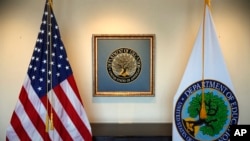
A federal judge in Texas has blocked a regulatory provision targeting for-profit colleges that was scheduled to take effect in July 2024.
Times Higher Education reports that the rule, which would affect student loans, was challenged by for-profit institutions. (June 2024)





